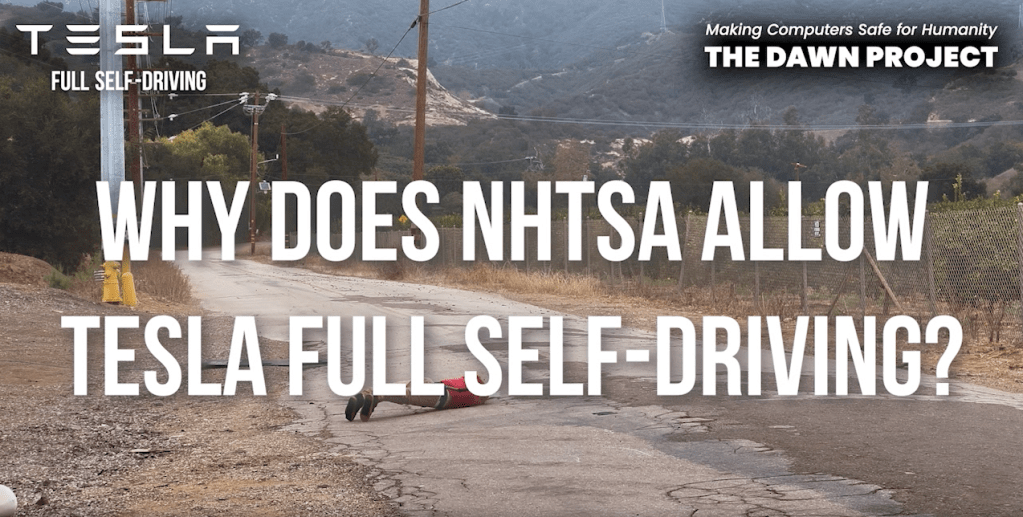This article has been updated with the cost of The Dawn Project’s Super Bowl ad.
Safety advocacy group The Dawn Project is taking its campaign to ban Tesla’s Full Self-Driving (FSD) system to the Super Bowl.
The 30-second ad, which is broadcasting to millions of football fans, including political leaders in Washington, D.C. and state capitals like Austin, Tallahassee, Albany, Atlanta and Sacramento, outlines several alleged critical safety defects of Tesla FSD, the automaker’s advanced driver assistance system (ADAS).
FSD is not actually fully self-driving, although it can perform some automated driving tasks like maneuvering through city streets and highways without driver input. The $15,000 system isn’t perfect, though, and drivers must remain alert to take over in case the system malfunctions or comes across something it can’t handle. There have been several reports of accidents occurring while Autopilot, Tesla’s lower-level ADAS, was engaged. As a result, Tesla has been criticized, investigated and sued for falsely marketing the capabilities of its automated driving systems.
This most recent critique comes as Tesla has recently released its latest version of FSD to around 400,000 drivers in North America, renewing concerns of the system’s safety. Last month, a Tesla engineer testified that a 2016 demo in which the company claimed its car was driving itself was actually staged.
The Super Bowl ad, which cost $598,000, features a collection of incriminating videos of Teslas behaving erratically while a voiceover claims FSD will “run down a child in a school crosswalk, swerve into oncoming traffic, hit a baby in a stroller, go straight past stopped school buses, ignore ‘do not enter’ signs, and even drive on the wrong side of the road.”
The Dawn Project asserts that Tesla’s “deceptive marketing” and “woefully inept engineering” is endangering the public, and calls on the National Highway Traffic Safety Administration and the Department of Motor vehicles to turn off FSD until all of the safety defects are fixed.
The Dawn Project’s founder, Dan O’Dowd, is also the CEO of Green Hill Software, a company that builds operating systems for embedded safety and security systems, as well as its own automated driving systems. That fact at once lends credence to the organization’s potential subject matter expertise, and makes it clear that Green Hill is in competition with Tesla’s FSD. Last year, The Dawn Project took out a full-page ad in The New York Times claiming Tesla’s FSD has a “critical malfunction every eight minutes.”
O’Dowd, who ran for a seat in the U.S. Senate last November and lost, says he’s making the investment in the new ad campaign because he wants to put pressure on politicians to prioritize ADAS safety. Some politicians like Sens. Richard Blumenthal (D-Conn.) and Edward J. Markey (D-Mass.) have called for more oversight on Tesla’s tech, but the issue hasn’t exactly gone mainstream.
After The Dawn Project aired a commercial last summer showing a Tesla Model 3 striking four different child-sized mannequins while driving a test track in California, Tesla sent the organization a cease-and-desist letter. The letter refuted all of the campaign’s claims, doubled down on Tesla’s commitment to safety and called to question The Dawn Project’s methodology.
“The purported tests misuse and misrepresent the capabilities of Tesla’s technology, and disregard widely recognized testing performed by independent agencies as well as the experiences shared by our customers,” wrote Dinna Eskin, a Tesla lawyer, in last year’s cease-and-desist. “In fact, unsolicited scrutiny of the methodology behind The Dawn Project’s tests has already (and within hours of you publicly making defamatory allegations) shown that the testing is seriously deceptive and likely fraudulent.”
Tesla supporters also rushed to defend the technology, including one investor who tested the FSD beta using his own kid. O’Dowd offered to run the test with Musk and other critics in person to prove the accuracy and methodology of his tests.
“Tesla continues to focus on features and marketing gimmicks, not fixing critical safety defects,” said O’Dowd in a statement. “Elon even stated that Tesla’s priorities were Smart Summon, Autopark and Optimus, not making sure that FSD will not run down children. It is clear that the priorities at Tesla are wrong, and it is time for the regulator to step in and switch the software off until all of the issues we have identified are fixed.”
Tesla hasn’t responded publicly to the Super Bowl ad, but CEO Elon Musk replied to a tweet showing the ad with the Rolling on the Floor Laughing emoji. Tesla disbanded its PR department in 2020, so TechCrunch couldn’t reach out for a comment.
In addition to the Super Bowl ad, The Dawn Project is also taking out a series of full-page ads in Politico and running additional TV ads in Washington, D.C., “where regulators are located,” that will call on FSD to be disabled until critical safety defects are fixed.































Comment